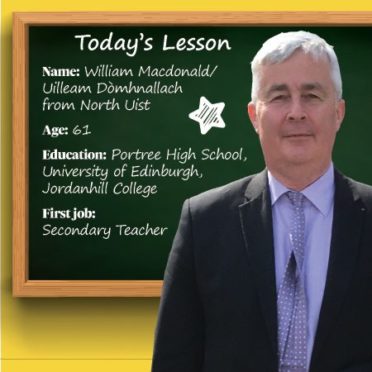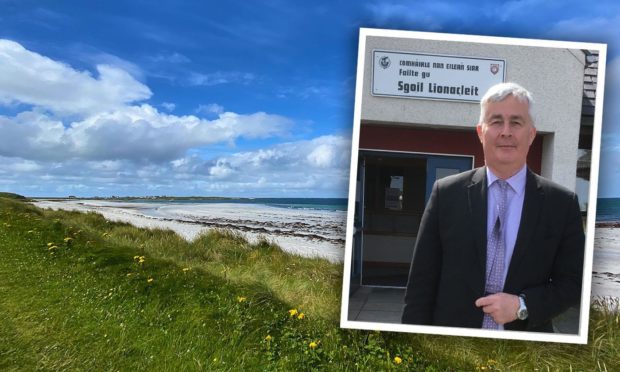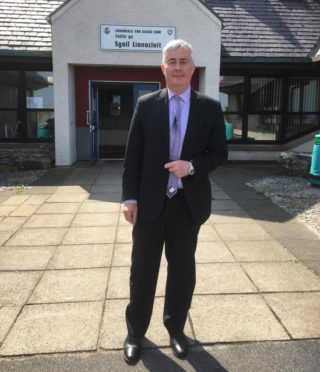With over 3,000 people and a catchment area that stretches the same distance as between Inverness and Glasgow, the Western Isles faced a daunting task keeping their students, teachers and families connected when lockdowns closed school doors in 2019.
But Director of Education, Skills and Children’s Services William Macdonald said that the islands were at an immediate advantage.
Thanks to e-Sgoil, the Stornoway-based e-learning school that now reaches pupils across Scotland and as far as Australia, the island schools were able to tap into existing resources when online learning became a must.
And Mr Macdonald believes that now there is space to further educate in the Western Isles in a way that enhances the area’s Gaelic language and culture and gives children opportunities for success without leaving the islands.
He has targeted these as his main goals since taking over as education boss in 2020.
Driving digital learning
When e-Sgoil was founded almost five years ago, it was meant to fill a specific gap between the schools in the Western Isles. But soon, schools across Scotland were reaching out for help staffing and conducting classes online and Mr Macdonald said that the Western Isles benefited from being able to help.
“We export teaching and we import teaching from some other authorities, and we work to widen the course offering so that the 100 children in Castlebay can have the same opportunities as the 1,100 in Stornoway.
“We want to make our learners as independent as possible, to prepare them for leaving the island and going on to whatever they choose.”
“E-sgoil has been part of the national delivery in the Covid-recovery plan. They’ve worked in partnership with education Scotland and National digital learning board and we’re teaching into all of the local authorities.”
And while e-learning seemed an innovative idea when e-Sgoil was founded, the pandemic quickly made it a necessity. Mr Macdonald said that lessons and skills learned during mandatory at-home learning have to be spun as positives going forward.
“We want to make our learners as independent as possible, to prepare them for leaving the island and going on to whatever they choose.
“I think the digital learning is probably one way of doing it.”
Multiple paths forward
But not every student has to set sail for the mainland to make a career for themselves. Mr Macdonald wants the Western Isles to promote paths to success for students who want to stay close to home.
His predecessor, Bernard Chisholm—in addition to helping pioneer e-Sgoil—also instituted a robust apprenticeship program. This gives young people a chance to learn a trade or skill that can get them into a stable career without having to leave the islands.
Mr Macdonald said this is a boost for the region’s economy and its heritage.
“We’ve now got over 300 apprentices, which is a lot in a small authority like ours, and a lot of them can go straight to get employment.
“There’s child care, there’s engineering, energy, education: there’s a wide range and there’s all sorts of fields that are available.

“I want to emphasise that I am merely carrying on the excellent work that Bernard Chisholm, my predecessor, started.”
Last year, school leavers in the Western Isles had the highest positive destination rate in Scotland. Roughly 98% of its students went on to further education, training or work.
Mr Macdonald believes that the apprenticeship program has a part to play in this achievement, but also that the availability of Gaelic education helps children achieve more in school.
Gaelic as a medium for success
Before the government instituted Gaelic Medium Education about thirty years ago, the language was struggling to keep a foothold in many parts of the country.
Mr Macdonald, himself from North Uist, said that the education system can play a part in its revival.
“For me, Gaelic is more than a language it’s a way of life. It’s core to your being.”
“Gaelic has become the default position for us in primary, so we expect all children to go to Gaelic medium unless parents request English medium.
“Statistics show that some children who go to Gaelic Medium are outperforming their English medium counterparts by P7.”
But if the language is to take root again, the community needs to get involved. Mr Macdonald said that this is an area where he wants to improve the education system.
“We want to engage more with parents and provide more leadership opportunities for young people.
“For me, Gaelic is more than a language, it’s a way of life. It’s core to your being. The culture comes first and the language is part of it.”
For more on the north and north east’s education bosses, use the links below.

